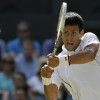By Randy Walker
@TennisPublisher
Mental demons were getting the best of Novak Djokovic.
After having lost his last three major singles finals and he had just blown a chance to close out Roger Federer in the Wimbledon final, failing to convert a match point and not being able to serve out the match. He had just lost five games in a row to lose the fourth set.
He took a bathroom break before he and Federer began the decisive fifth set of their soon-to-be Wimbledon epic where he tried to refocus.
“I had a chat to myself,” Djokovic told ESPN’s Tom Rinaldi of his bathroom break. “I was loud to myself saying ’Believe in yourself!’” It is not a cliché. It really works, even when you don’t feel it. At times to say some positive things to yourself. That’s exactly when you should do it.”
Djokovic’s positive self-talk became a self-fulfilling prophecy as he was able to overcome the extreme adversity and show resilience showcased by the greatest of sports champions and triumph over Federer by a 6-7 (7), 6-4, 7-6 (4), 5-7, 6-4 margin.
It was a pivotal match in the history of men’s tennis.
With the win, Djokovic claimed his second Wimbledon title and regained the world No. 1 ranking from Rafael Nadal. He also won his seventh career major championship – tying him with the likes of John McEnroe, Mats Wilander and John Newcombe and moving him ahead of players such as Boris Becker, his coach, and Stefan Edberg, Federer’s coach.
He also snuffed out Federer’s attempt to create even more tennis history, preventing him from winning a record eighth Wimbledon title and from allowing the 32-year-old from becoming the oldest man to win a major singles title in the Open Era (since 1968).
Despite having won six major titles, Djokovic was on a career stretch where he was beginning to be defined for his losses in major finals as opposed to his victories. A year earlier, he lost to in the Wimbledon final to Andy Murray, allowing him to become the first British male in 77 years to win the men’s singles title at the All England Club. He then lost a tough four-set final to Rafael Nadal at the U.S. Open and, after a quarterfinal loss to Stan Wawrinka at the Australian Open, lost in the final of the French Open to Nadal for a second time in three years. In all, he had lost five of his last six major finals.
Federer and Djokovic showcased a high-level of serving prowess in the first three sets of their Wimbledon classic, Djokovic securing the only service break of the three stanzas in the second set en route to taking a two-sets-one lead. He then broke Federer twice – against being broken once himself – to take a 5-2 lead in the fourth set, on the cusp of four-set victory.
After Federer held for 5-3, he broke Djokovic when the Serb served for the title to draw to 5-4, before Djokovic negotiated his way to a match point in the 10th game of the fourth set. Federer’s first serve down the T was called out, but Federer, an opponent of the Hawk-Eye technology, challenged the call, which revealed the ball to be on the line, giving him an ace. Federer then held strong to hold before winning the next two games to force the fifth set.
The Federer -Djokovic match was played 11 years to the day when Federer won his first Wimbledon title – and first of his record 17 major singles titles – at Wimbledon in 2003. It was also played six years to the day of the only other time Federer had lost a Wimbledon final – the 2008 final to Rafael Nadal in a match tennis historian Steve Flink in his book “The Greatest Tennis Matches of All Time” called the best ever. To read more of the anniversaries and match summaries of nearly every pro tennis match Federer has ever played, get the book new “The Days of Roger Federer” here available for sale here: http://www.amazon.com/dp/1937559378/ref=cm_sw_r_tw_dp_n6VTtb183B1F4GB2 and where books are sold.

